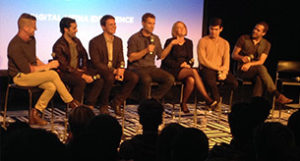Feb. 7, the cast of HBO’s “Looking” came to aTVfest ready to talk about what it’s like to act in a show centered around gay relationships and how they think the show is impacting the perception of gay culture. Before the cast took the stage for a panel discussion, the audience watched the first two episodes of the show where they were introduced to the main characters. The ensemble cast includes Jonathan Groff, who plays Patrick, Frankie Alvarez, who plays Agustin and Murray Bartlett, who plays Dom.

Like many of the gender-specific shows in the past 50 years, such as “Golden Girls,” “Queer as Folk,” “Sex in the City” and more recently, “Girls,” “Looking” uses its characters to exemplify a different aspect of their culture, in this case, gay culture. Patrick is a smart, go-getter with an unfortunate crush on his gay, but taken, new boss. Agustin is a struggling artist in what looks like an open relationship. Dom is turning 40 and wondering what happened to his life.
After the screening, the cast took the stage with the addition of Raúl Castillo, O.T. Fagbenie and executive producer Sarah Condon. The cast talked about how “Looking” challenges the ideas set by previous works about the lives of gay men.
“The most famous gay film is ‘Brokeback Mountain’ where it’s two men who are devastated with the fact that they’re gay. This is a TV show about men where being gay isn’t their main struggle. It’s their love life, their friendships, their work life. I think, because of that, it becomes universal,” said Groff.
In fact, it seems as though being gay comes secondary when watching “Looking.” Like with most of HBO’s programming, “Looking” focuses less on the perception and more on the reality of the lifestyles their programs depict.
“I think the most important thing is unique point of view,” says Condon. “Andrew Haigh is known for being one of those filmmakers that really transcend the gay label. We look for voices that break out and in their specificity you get universality.”
This universality is accomplished through writing that focuses more on realness in conversation. Actors were told they could improvise if they felt it were appropriate.
“I feel like the scripts were a gift. It jumps off the page like a conversation. It’s kind of rare to get that,” said Bartlett.
While the script was important, the right casting also played a key role in “Looking.” Condon admits that although they weren’t looking for gay actors, that they wanted actors who were open-minded, as there was going to be a lot of sex on the show.
When asked who he’d like to be his on-screen interest, Groff said, “Frank Ocean. Anyone? Anyone?”
Some might think the openly gay singer-songwriter and rapper the perfect fit for the show. In fact, Condon admitted he was considered early on in casting: “I’ll just say we looked into Frank Ocean early on, but he was on tour. It’s a possibility. You never know.”
Although Ocean’s appearance isn’t yet in the works, it seems as though the show is doing fine without him. Television critic Mary McNamara calls the show an “authentic look inside the lives of gay men.” SCAD students seem to agree.
George Prah, second-year graphic design student said, “I don’t know much about the culture, but based on what everyone was saying, it seemed pretty realistic.”



















